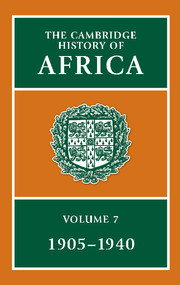Book contents
- Frontmatter
- Introduction
- 1 The imperial mind
- 2 Aspects of economic history
- 3 Christianity
- 4 Islam
- 5 African cross-currents
- 6 The Maghrib
- 7 French black Africa
- 8 British West Africa and Liberia
- 9 Belgian Africa
- 10 Portuguese Africa
- 11 Southern Africa
- 12 British Central Africa
- 13 East Africa
- 14 Ethiopia and the Horn
- 15 Egypt and the Anglo-Egyptian Sudan
- Bibliographical Essays
- Bibliography
- Index
- 10 West Africa from Senegal to Dahomey, 1935
- 13 Belgian Africa, 1939
- References
1 - The imperial mind
Published online by Cambridge University Press: 28 March 2008
- Frontmatter
- Introduction
- 1 The imperial mind
- 2 Aspects of economic history
- 3 Christianity
- 4 Islam
- 5 African cross-currents
- 6 The Maghrib
- 7 French black Africa
- 8 British West Africa and Liberia
- 9 Belgian Africa
- 10 Portuguese Africa
- 11 Southern Africa
- 12 British Central Africa
- 13 East Africa
- 14 Ethiopia and the Horn
- 15 Egypt and the Anglo-Egyptian Sudan
- Bibliographical Essays
- Bibliography
- Index
- 10 West Africa from Senegal to Dahomey, 1935
- 13 Belgian Africa, 1939
- References
Summary
For the period under review in this volume, explanations of much that happened in Africa must be sought in Europe. It is necessary to examine the impact of Africa upon the colonial powers if we are to understand the process by which these powers tried to mould Africa for imperial purposes. The acquisition of African empire gave new point to questions about the aims and methods of white enterprise on the continent. How should Africa be governed, and to what end? How far should metropolitan governments intervene? Could the ambitions of governor, capitalist and missionary be reconciled? What steps should be taken to reduce African ignorance of the white man's techniques, and white ignorance of Africa? What use should be made of contemporary advances in knowledge? What part should Africans play in the colonial social order?
Even to list such questions, however, gives an exaggerated impression of the urgency with which they were usually regarded. The imperial mind, whatever its quality, was not in general much concerned with Africa during our period. The speed with which so much of Africa had formally been placed under European control should not be taken to be a measure of its importance to the invaders. Much of the Scramble had been motivated by the negative aim of excluding rival powers: it was not a defence of present interests so much as speculation in possible, but quite unproven, benefits. South Africa, certainly, was important to Britain: by 1911 (when it had just ceased to be a British responsibility), British investment there amounted to £351 m; this was on much the same scale as British investment in India or Canada, or Australia and New Zealand combined; it was half the sum invested in the USA and a good deal more than that in Argentina.
- Type
- Chapter
- Information
- The Cambridge History of Africa , pp. 24 - 76Publisher: Cambridge University PressPrint publication year: 1986
References
- 3
- Cited by



